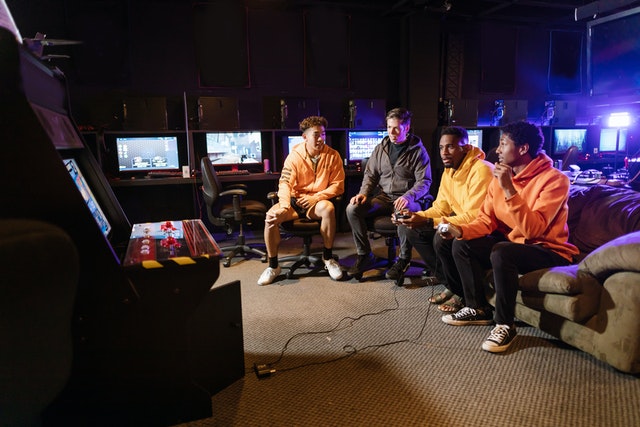[opinion piece]
Online gaming — bless the coders — has become a social lifeline for millions of people; and I think these people, you people, will wholeheartedly agree. People that play online games chat with one another on a daily basis, (take the flirtatious Kyle Pred from the Paleto Bay Sheriff Department in a knock-off version of GTA V) talking about the most random stuff from game strategies to family life and brand new hot topics (hello there, Will Smith, Chris Rock.) There might also come up conversations over the activities and happenings within the gaming system, the “hometown” gossip, let’s say. To be honest with ourselves: have we ever seen this level of interactivity before?

Video games just don’t draw in players; they also bring together communities of people with similar interests. Online games, regardless of language or origin, have the ability to help individuals — even those who are not stuck in their mom’s basements — simply socialise. Gamers have long recognized whatever the rest of the world is only just noticing: this screen has a wholly profound connection on the other side, a universe of codes that is as incomprehensible and unpredictable as the cosmos. And guess what? A whole lot of these same people exhibit the very fact, each day.
These games are channels by which players can inspire to join a community, share their thoughts and opinions, and form long-lasting ties — so much so that it changes people.
Online games have undoubtedly allowed users to engage in virtual-social connections. They may now share their values and views (as an enthuse) and experience with millions of individuals all around the world. This social platform has a staggering number of people jostling and interacting within — one can only imagine the things happening all together at the same time, like neurons firing in a colossal-sized brain.

In video games, social contact is not the same as it is in real life. There is almost never an open interaction between the player and the game character. The sole way for players to interact is through messages that ask them to react to a certain incident. Because video games do not need any physical contact, they are an excellent way to teach social skills such as teamwork, bargaining, and trust.
How can internet gaming provide people with a social life is a frequently addressed issue. For masses of people around the world, video gaming is social sustenance. This type of social engagement not only entertains individuals but also helps them deal with challenges they face daily. These individuals may be dealing with issues such as bullying, domestic abuse, social injustice, financial hardships, the like. There is only so much one can keep in for a long time, am I right?
People from all cultures and origins have been introduced to each other through gaming. In reality, countless enthusiasts from all over the world use video games to form bonds and friendships with people from other nations. Millions of individuals now perceive online gaming to be a social activity. Whether individuals play games for enjoyment or a living, they have proven to be a social outlet.

Today’s internet games are more interesting than ever. The reason behind this may be that game designers have managed to build games that can catch players’ attention. The games’ visuals are so lifelike that players become completely infatuated with this awesome world.
People’s social networks grow as they play games. They encounter other players in this virtual environment and might establish alliances or compete with them. They may form bonds with one another and even embark on journeys together. They can also use blogs and forums to share their personal experiences. All of these activities contribute to the strengthening of their social network.
Every individual wishes to be acknowledged and respected by a larger group. The situation is quite familiar for those gamers who are searching for aid (of any sort) and appreciation from others — that human need from Maslow’s Hierarchy pyramid, i.e., esteem needs. This is taken even further by video gaming, which provides gamers with a sense of belonging to a wider community, improving their psychological well-being, a gap filled.

Online gaming is distinct from conventional gameplay in that it promotes sociability via video calling and other forms of communication. The game is typically amusing in itself, but video/live chatting improves the atmosphere further. It’s a watershed moment in sociability since almost every game now allows participants to discuss and critique their plays and actions in real-time.
The traditional gaming systems of the past did not allow for this form of social engagement. This difficulty has been solved by online gaming. Players are no longer bound to their gaming console’s little universe. They may now reach out to individuals all across the world, regardless of their actual location. They can extend the scope of their social interactions via chatting (both verbally and non-verbally).
Taking into account the past few plague-invested years. During the pandemic of COVID-19, gaming has literally exploded in popularity, reaching individuals who had previously shunned it, calling it a “couch-potato habit.”

According to a new study, by an American business research organisation, four out of four subjects in one poll in the United States played video games in the previous six months. Gaming sales were increasing at a time when many other businesses were crumbling; the world was crumbling around the untouched gaming industries. This year, 2022, global sales are predicted to increase by twenty per cent to a hundred and seventy-five billion dollars —- imagine! Billions!
In conclusion, people who are socially timid can use gaming to engage with people without feeling overwhelmed. Playing video games is more than just a hobby; it’s a cultural force that encourages social interaction and helps people to form meaningful bonds with people across the globe.
In rare cases, it can even advance to a greater stage and result in offline friendships and relationships. Students may relax and reduce tension while also improving their focus and creativity by playing online games. Several aspects have been recognized as contributing to the effectiveness of internet gaming as a socialising tool.



